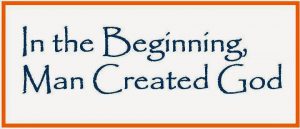Is Religion Firmly in Control of Our (Lack of) Modernity?
This essay is from NOSHA vice-president, Jim Dugan, who was inspired to write it after his visit to Baton Rouge once again to present the case for repeal of the Louisiana Education Science Act in April.. The effort was rejected again. **********
If we face the realities of history, we are forced to acknowledge that the world has always been run according to some kind of humanism. Earthly decisions have always been made by human minds. No god ever sat in assembly or parliament, no angel ever whispered into the ear of king or legislator, and no scripture has ever been more than an inspiration when taken too far out of the context of its original time and place. When we’ve had periods of peace and prosperity, it’s because smart people sat down to face our problems with honesty and pragmatism. When we’ve had eras of upheaval and decline, it’s because we’ve refused to face reality, or weren’t smart enough, or weren’t able to cooperate well enough to implement a solution.
For most modern Americans, this is simply a matter of observation. The wicked too often prosper, the righteous too often go hungry, and suffering is altogether too random, to allow a belief that any deity intervenes miraculously in earthly affairs.
Even those who believe in one or another god must acknowledge this truth, although some will not. There are those who believe not only in a god and a soul, but also in divine intervention, in blessings and curses and miracles, in deities that take sides in our elections and wars. They believe that rules and maxims established by nomadic goat-herders or in agricultural kingdoms are sufficient guides for life in the age of the internet and global economy. But such people really are a minority. Pushing the numbers as far as demographics will allow, maybe a third of us could believe in divine miracles. That leaves at least two thirds, a super-majority, who do not.
Why, then, is it so hard for the people of these United States to live in the 21st century instead of the 19th, or even the 16th?
We’ve achieved so much in the last 250 years. The Enlightenment philosophy of the 18th century initiated profound social changes. We consciously developed new systems of government designed to enable individual agency by limiting the worst abuses of power and wealth. The struggle took centuries, but we did away with the institution of slavery, recognized the unfairness of racism, stopped treating adult women like dependent minors, and accepted the simple fact that not everybody is heterosexual. Along the way we built a growing economy, a vigorous middle class, a world-class system of higher education, and an information super-highway. We the people, rather than chance or deity, deserve the credit for the positive outcomes and the blame for the negatives.
Was it just too much too fast? In the early 21st century we seem to want not just to pause and reassess, but even to step backwards.
Once the driver of our economic growth, today’s middle class is experiencing an objectively measurable reduction in upward mobility and standard of living. Economic growth now largely improves the lot only of the wealthiest few. We know that education is critical to technological development, economic growth, and higher individual incomes, but invest less in it, both privately and publically, year after year. The U.S. lags in the accessibility of health care and the certainty of social welfare. Our prisons are filled to overflowing, mostly with individuals who present relatively little risk to civil society, while corporate gangsters, economy wreckers, and grand-scale embezzlers are mostly free to go about their predations. This seems to be one of those periods of decay in which we’re unwilling to face our problems with honesty and intelligence. We’ve gotten stupid about public policy.
Firmly embedded in this backwards march, and in many ways causing it, is a nauseating thread of counter-intellectualism, a hypocritical, disingenuous, public religiosity, worse now than at any time in the last 300 years. On May 5th (2014), the U.S.Supreme Court ignored the official secularism enshrined in our constitution,ruling that prayers said at the opening of city council meetings are not really religious, and so must be endured by all, regardless of differences in religion or lack of religion. Legislators in Louisianaand other states are trying to pass laws requiring a hospital to keep a dead ordying woman on life support against her express wishes, and over the objections of her next of kin, if the woman happens to be pregnant. The accessibility of abortion is fast disappearing, even though we still don’t have free and universal access to birth control, and most states refuse to require medically complete and accurate sexual education in public schools.
We’re on a fast track to granting a right of religious conscience and exercise to for-profit corporations. School boards (and in Louisiana, the Senate Education Committee) bend and twist to find ways to get Creationism and the Bible into the classroom. Legislatures around the country are using their funding powers to coerce public universities to drop curricular materials that run counter to “traditional family values.” Office holders pontificate about family values and the sanctity of marriage, and even though they are repeatedly revealed to be philandering frauds, this hypocrisy never stops. Simpering public piety has somehow set itself in direct opposition to intelligence, knowledge, education, and practicality.
If we’re going to be fair, we have to acknowledge that religion has always been important in America. But it was never what made us great. Our historical achievements came at times when we were willing to use our heads, sometimes co-existing with religion, sometimes bitterly opposing religious teachings, but never subordinated to religion. Our greatness is best exemplified by Thomas Jefferson, not Cotton Mather, by the separation of church and state, not the Salem witch trials.

